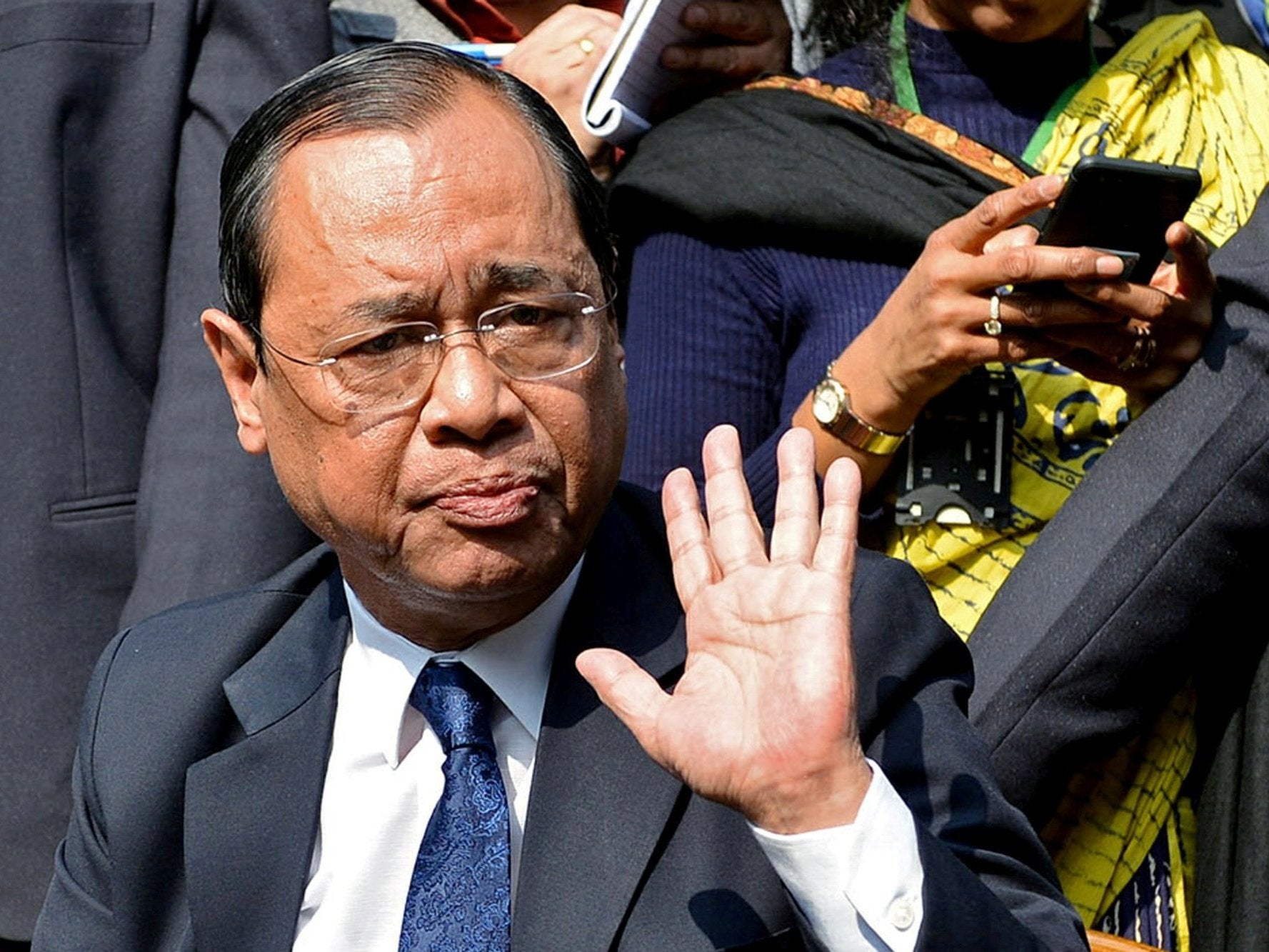Woman who accused India's most powerful judge of sexual harassment says she is 'extremely scared and terrified' after Ranjan Gogoi cleared
Protesters gather outside India’s Supreme Court carrying placards calling for a new and impartial investigation

A former worker at India’s Supreme Court who accused the country’s most powerful judge of sexual harassment has said she is “terrified” after the Chief Justice of India was cleared of wrongdoing.
A court inquiry on Monday cleared Ranjan Gogoi of sexual harassment allegations made by an ex-employee at his official residence in New Delhi.
It is the most high-profile case in a wave of sexual harassment accusations after a #metoo movement swept the country.
His accuser, who said Mr Gogoi sexually harassed her before firing her after she rejected his advances, has said she is “highly disappointed and “dejected” after a panel of judges dismissed the complaint.
The 35-year-old complainant, whose identity has been withheld, said she and her family “remain vulnerable to the ongoing reprisals and attack” - adding that she felt “gross injustice has been done to me as a woman citizen of India”.
“Today, my worst fears have come true, and all hopes of justice and redress from the highest court of the land have been shattered,” the former court assistant said in a statement.
She added: “I am now extremely scared and terrified because the in-house committee, despite having all material placed before them, has given me no justice or protection and said nothing about the absolutely mala fide dismissals and suspensions, indignities and humiliations suffered by me and my family.”
She said she had previously voiced concerns that the proceedings were being carried out in a way which would not “mitigate the stark asymmetry of power” between herself and Mr Gogoi.
The accuser said she was not able to understand why her complaint was dismissed because she had not been provided with a copy of the report.
In her complaint filed to the court last month, she accused Mr Gogoi of harassing her when she worked in an office at his home last year – saying she and her family were victimised after she spurned his advances. Mr Gogoi has denied the charges.
Last week, she withdrew from proceedings of the three-member panel of judges investigating the case, saying she did not expect justice from it.
Dozens of protesters gathered outside India’s Supreme Court on Tuesday carrying placards calling for a new and impartial investigation.
“Transparent and fair due process is a must,” read one of the placards, while another read, “Supreme injustice”.
Security was strengthened outside the court, with dozens of paramilitary police and trucks carrying water cannons deployed in the area.
Police quickly dispersed the crowd and most protesters were taken away in police vans soon after they gathered. Officers at the site said it was illegal to hold demonstrations at the Supreme Court.
“We were not allowed to protest even for five minutes!” lawyer Amritananda Chakravorty said in a Twitter message. A journalist, Gaurav Sarkar, added that he had been “chucked” into a police van for covering the protest.
A group of 350 women’s rights activists and civil society members have called for a fresh inquiry into the accusations.
“This case has exposed the urgent need for just, transparent and fair procedures to be laid down as soon as possible...what is at stake is not just the rights of women, but also the credibility of the Supreme Court,” they said in a statement.
The complainant has said she will consult her lawyer to help her decide on the next steps to take – adding that she is on “the verge of losing faith in the idea of justice”.
Violence against women is a widespread problem in India – more than 50 per cent of Indian men and women still believe that wife-beating can be justified.
One woman is killed every hour for not providing enough dowry, according to 2013 statistics. A dowry is an amount of property or money given by a bride to her husband at the time of marriage.
According to government data, the number of crimes against women reported to police in India rose by 83 per cent from 2007 to 2016. Four rape complaints were reported every hour in 2016, the data showed.
But the conviction rate for crimes against women in India is very low – only 18.9 per cent and the lowest in a decade – according to the latest official crime statistics from 2016. The average conviction rate for all crimes is 47 per cent.
Rape is one of the most under-reported crimes in India – with some estimates indicating 90 to 95 per cent of rape cases remain unreported.
Join our commenting forum
Join thought-provoking conversations, follow other Independent readers and see their replies
Comments
Bookmark popover
Removed from bookmarks